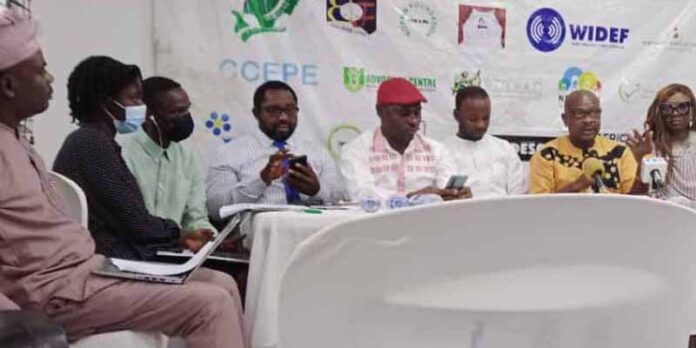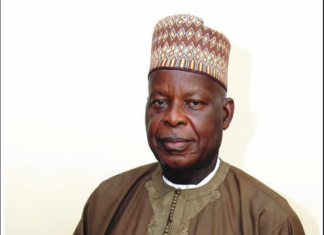AGFCS report examined how military and non-military measures are deployed to combat security threats and curtail civic freedoms.
By Ishaya Ibrahim, News Editor
Activities of Boko Haram, bandits, unknown gunmen and other criminals are providing the Nigerian government with the legitimate means to not only spy on the bad guys but also restrict the freedoms of critics, a new report by a coalition of civic society organisations has revealed.
The report, Security Playbook of Digital Authoritarianism in Nigeria, was the product of research by the Action Group on Free Civic Space (AGFCS), a coalition of more than 40 civil society organisations.
The AGFCS report examined how the military and non-military measures—mostly copied from abroad, are deployed to combat numerous security threats in the country, including terrorism in the northeast region, create opportunities for the use and abuse of counterterrorism measures and security laws to curtail civic freedoms.
“This is potentially becoming the dominant driver of closing civic space in Nigeria,” a statement signed by the AGFCS researchers that worked on the project said.
RELATED
Activists express concern over tech surveillance of Nigerians
According to the statement, the first report, The Security Playbook of Digital Authoritarianism in Nigeria, unveils how huge budgetary allocations, equipment, and technologies originally procured in the name of counterterrorism and curbing insecurity are being diverted to monitor the movement of citizens, track the activities of civic actors online, intercept private communications, and limit the ability of civic actors to organize, associate and assemble freely.
“The most popular tactics include the interception of private communications, network shutdowns, seizure of mobile phones and computers, use of forensic technology to extract and decode every ounce of data stored within digital devices, obtaining call records of individuals from network providers without a judicial warrant, blocking internet and website access through several technical protocols etc,” the report reveals.
According to the AGFCS findings, the government’s enhanced digital surveillance capacities have been made possible by the collection of big data in the form of biometric data collection, centralized databases, compulsory digital identification programs, data-warehouses, algorithm mapping, and so forth.
“Although the government has used excuses like countering terrorism, fighting corruption and easing service delivery to justify intensive data collection, research findings prove otherwise. There is evidence that large volumes of personal data, including biometric information stored on multiple centralized databases, have been frequently compromised thereby increasing citizens’ exposure to privacy intrusions, targeted advertisements, identity fraud and blackmail,” the AGFCS reveals in its findings.
The report shows how state actors could not have recorded considerable successes in their diversionary and restrictive adventures without the cooperation of telecommunication companies (Telcos), internet service providers (ISPs), content moderation platforms, private companies, including foreign suppliers of surveillance technologies, and local as well as state regulatory agencies.
The AGFCS added that the major suppliers of surveillance technologies to Nigeria include the Israeli-owned company, Circles; the U.S.-based Access Data Group, China’s ZTE Corporation, Cellebrite, FTK, Elbit Systems, Romix Technologies, together with Packets Technologies AD, another Israeli company operating out of Bulgaria.
The second phase of the report, Harms from Abroad – The Impact of Global Security Measures on the Civic Space in Nigeria, shows how the global war against terrorism—instrumented in several norms set by international institutional mechanisms like the United Nations Security Council, the Financial Action Task Force (FATF) and the UN’s Global Counterterrorism Strategy—is providing legal impetus for the Nigerian state to domesticate and implement hard security measures that limit civil society and fundamental freedoms.
The report reveals that because terrorism lacks a clear definition globally, the absence of a universally accepted definition of terrorism has acted as a motivation for governments to drift towards authoritarianism and apply overreaching measures to restrict the democratic rights of civic actors under the guise of preserving national security.
AGFCS reveals that the most popular tactics include (1); recharacterizing organised dissent as terrorism (2); proscription of self-determination movements; (3) criminalizing free expression and (4) restrictions on open democracy.
“Findings further show that governments like Nigeria introduce and enforce these stringent measure measures that shrink civil liberties in order to escape the dire consequences of non-compliance to global security norms and measures,” the report says.
It added that the incidents tracked on the Closing Spaces Database reveal that civic actors—such as journalists, protesters, LGBTQ activists and organizations, female activists and bloggers, persons with disabilities—are most affected by the state’s arbitrary surveillance and misuse of security measures.
“The disproportionate crackdowns on civic actors are usually premised on national security concerns or the enforcement of health emergency measures, or premised on the rhetoric of anti-money (AML) laundering and countering of terrorist financing. Non-profit organizations operating in the country also pay a heavy price for these heightened security measures. Blanket restrictions, multiple registration controls, onerous reporting requirements, deregistration, forced closures, aggressive financial surveillance add to the list of heavy burdens NPOs are subjected to in the name of counterterrorism,” the report reveals.
The AGFCS offered the following recommendations…
• Civil society, members of the public and Nigerian parliament should institute a process to properly define the term ‘‘terrorism’’ in existing anti-terrorism legislation. The definition of terrorism must be sufficiently clear and not exploited to target civil society actors or stifle freedom of expression.
• The Nigerian government can explore the use of legislative measures, import controls and strong sanctions against powerful businesses and individuals that supply and operate spyware technologies that are used to indiscriminately surveil citizens in the country.
• Civil society and concerned citizens can push for a review of all data protection legislation and judicial provisions that empower state agents to arbitrarily surveil persons or obtain personal data of citizens ‘‘without warrant’’ or court order.
• Businesses should seek to protect the rights of clients and customers by developing and adhering to data privacy policies and processes espoused under international and local laws. The United Nations’ (UN) Guiding Principles on Business and Human Rights (2011) provides standards and call to action processes that offer guidance to corporations on how to respect and protect human rights within their sphere of influence.
• International organizations can offer support to the advocacy by local organizations by pushing for stronger legal regimes and stiffer sanctions for suppliers of digital technologies used to indiscriminately surveil the activities of civic actors.
The press statement is signed by the following organisations
1. INTERACTIVE INITIATIVE FOR SOCIAL IMPACT (DATAPHYTE)
2. THE INITIATIVE FOR EQUAL RIGHTS (TIERS)
3. SPACES FOR CHANGE | S4C
4. JUSTICE RIGHTS INITIATIVE (JRI)
5. VISION SPRING INITIATIVES (VSI)
6. CENTRE FOR CITIZENS WITH DISABILITIES (CCD)
7. WORLD IMPACT DEVELOPMENT FOUNDATION (WIDEF)
8. RULE OF LAW AND ACCOUNTABILITY ADVOCACY CENTRE (RULAAC)
9. BUILDING BLOCKS FOR PEACE FOUNDATION (BBFORPEACE)
10. SB MORGEN INTELLIGENCE (SBM INTELLIGENCE)
11. YOUTHS RIGHT AND ENVIRONMENTAL ADVOCACY CENTRE (YEAC)













